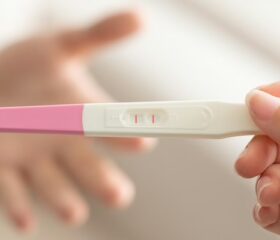Can You Get Pregnant With Polycystic Ovary Syndrome (PCOS)?
If you're suffering from polycystic ovary syndrome (PCOS), will you still be able to get pregnant?

- Can you still get pregnant with polycystic ovary syndrome (PCOS)?
- Why does PCOS often make it trickier to get pregnant?
- What is the success rate for getting pregnant with PCOS?
- How to improve your chances of getting pregnant with PCOS
- What to do if lifestyle changes don’t improve your ovulation
- Are there risks from getting pregnant with PCOS?
- Final thoughts
Polycystic ovary syndrome (PCOS) is a common hormonal disorder that affects about 5%–10% of women of reproductive age. 1
It happens when the ovaries (the organs that produce and release eggs) develop small cysts that make hormones called androgens. 2 Men naturally have more androgens than women. If a woman has too many, as is usually the case with PCOS, it can disrupt her menstrual cycle and make it hard to conceive.
However, that doesn’t mean it’ll be impossible for you to get pregnant if you have PCOS. Read on to learn how PCOS can affect your fertility and how to get pregnant even if you suffer from it.
Can you still get pregnant with polycystic ovary syndrome (PCOS)?
Yes, even though this condition can affect your fertility and make it hard to conceive, it’s possible to get pregnant and have a baby if you have PCOS.
If you want to get pregnant fast, the best route is to opt for assisted reproductive technologies (ARTs), like in vitro fertilization (IVF) and intrauterine insemination (IUI).
There are plenty of treatments available for women suffering from PCOS, and they can significantly increase your chances of pregnancy success.
Why does PCOS often make it trickier to get pregnant?
PCOS can affect your menstrual cycle by disrupting ovulation (when one of your ovaries releases a mature egg to be fertilized).
You may ovulate sporadically with PCOS, or you might stop ovulating altogether (a condition called anovulation). Both of these make you less likely to be fertile each month, making conception much harder.
Other ways PCOS affects fertility
Beyond disrupting ovulation, PCOS can also make it harder to conceive by causing: 2 3
- Irregular menstrual cycles: PCOS is one of the most common causes of irregular menstrual cycles. Getting pregnant with irregular periods can be challenging because most months, you won’t know when you’re fertile.
- Issues with ovulation tracking with PCOS: This condition makes it difficult for women to use ovulation predictor kits (OPKs). These urine tests look for luteinizing hormone (LH), which surges just before you ovulate. Women with PCOS often have high LH levels, so you may see positive test lines on your OPKs throughout your cycle, making it hard to identify the LH surge that precedes ovulation. 4
- Insulin resistance: Many women with PCOS have insulin resistance. This is when your body’s cells don’t respond properly to insulin, a hormone that regulates blood sugar. As a result, the pancreas produces more insulin, causing your ovaries to produce excess testosterone. This further disrupts ovulation and can lead to weight gain, which may also decrease your fertility.
On top of the physical issues that PCOS causes, you may feel stressed as a result of your symptoms. Stress is another common trigger for irregular periods, so it may worsen your fertility issues. 5
What is the success rate for getting pregnant with PCOS?
Again, for the best chance of conceiving with PCOS, you should use assisted reproductive technologies. Research has found that 70% of women who suffer from PCOS may be able to give birth to a live baby by using medication that induces ovulation. 6
Again, that’s the rate of pregnancies that make it to term; rates of conception aren’t precisely known, but are significantly higher. (Not all pregnancies are successful, of course, and unfortunately, if you have PCOS, you’re more at risk of an early miscarriage, something that we’ll expand on below.)
Can you get pregnant naturally with PCOS?
While many women with PCOS opt for ARTs to help them conceive, it’s sometimes also still possible to get pregnant naturally. 7
You may be able to get pregnant with PCOS by making a few healthy lifestyle changes (which are a good idea when you’re trying to get pregnant anyway). One study found that 60% of women who adjusted their lifestyles (e.g., by limiting calories and exercising) were able to successfully ovulate. 8
With that said, to reiterate, your odds of getting pregnant are much better with ovulation inducement treatments or ARTs. 3
How your partner’s fertility affects your chances of getting pregnant
While it’s easy to focus solely on PCOS, male fertility is another big factor that affects your odds of getting pregnant. About one third of infertility cases are caused by male reproductive issues. 9
Before starting a round of potentially expensive fertility treatments, make sure your partner undergoes semen analysis to check for issues on his end.
Pregnancy can cause positive results on ovulation tests
If you’re trying to get pregnant with PCOS, you’re probably used to seeing false positives on OPKs. It’s worth noting that pregnancy can also cause faint positive results on ovulation tests because LH is chemically similar to the hormones your body produces when you conceive. If you see a positive OPK result but don’t think you’re ovulating, don’t automatically blame PCOS—it’s worth taking a pregnancy test to see if you’ve gotten lucky!
How to improve your chances of getting pregnant with PCOS
As mentioned, you can often alleviate the hormonal imbalances and insulin resistance caused by PCOS with a few simple lifestyle changes. This is often all it takes to start ovulating naturally, which will make your chances of conceiving much better.
Make sure you:
Eat well
Not only will a balanced diet prepare your body for pregnancy, it’ll also help stabilize your blood sugar and insulin levels.
If you’re curious about what to eat to get pregnant faster, start by:
- Limiting processed foods and sugars: Cut back on sugary drinks, baked goods, and highly processed snacks, as they can all cause sharp spikes in blood sugar. 10
- Choosing complex carbohydrates: Opt for whole grains like brown rice, quinoa, and oats. Their high fiber content will slow down sugar absorption. 11
- Prioritizing lean protein: Include sources like chicken, fish, beans, and lentils in your meals to help you feel full and maintain stable energy levels.
- Loading up on fruits and veggies: Fruit and vegetables give your body plenty of important vitamins, minerals, and antioxidants that will support your overall reproductive health.
You can always chat with your doctor if you don’t know where to start with your diet. They’ll be able to give you a diet plan that’ll help stabilize your insulin levels and ensure you get the right nutrients to combat PCOS.
Take prenatal vitamins
If you’re trying to get pregnant, you should start taking a prenatal vitamin—even though you haven’t conceived yet.
Prenatals prepare your body for pregnancy and can be a great way to combat some of the issues that PCOS presents. The most important vitamins and minerals in your prenatal supplements include:
- Folic acid: Make sure your daily prenatal vitamins contain at least 400 mcg of folic acid. As well as being essential for growing babies, this B vitamin may be able to manage your insulin resistance by helping your body metabolize carbohydrates better. 12
- Vitamin D: Studies have found a link between PCOS and vitamin D deficiency. 13 This vitamin also helps prevent congenital rickets and fractures in newborn babies. 14 Your doctor may suggest you take an additional vitamin D supplement if you don’t get enough from your prenatals alone.
- Zinc: Women with PCOS are more likely to be zinc-deficient. Fortunately, zinc is a common ingredient in prenatal vitamins. Zinc can combat PCOS by preventing or correcting insulin resistance, blocking excess androgen production, and even stimulating your ovarian follicles to produce and release eggs. 15
Other worthwhile vitamins and supplements for women with PCOS
Outside of prenatal vitamins, many doctors also recommend taking other supplements if you suffer from PCOS, such as: 16
- Inositol: This vitamin-like substance can reduce your fasting blood glucose levels (your blood sugar levels when you haven’t eaten for 8 hours or more), fasting insulin, and testosterone levels.
- Berberine: While there’s limited research on the effectiveness of berberine for women with PCOS, it may improve your fasting blood glucose and insulin levels, combating insulin resistance. 17
- Omega-3 fatty acids: These “healthy” fats are anti-inflammatory and could also improve your insulin resistance and balance your hormones. 12
The best course of action is to ask your doctor for tailored recommendations for supplements that might help alleviate your PCOS symptoms and potentially promote regular ovulation.
Get moving
Regular moderate exercise will improve your insulin sensitivity and boost your fertility. 18 You don’t need to run a marathon, but find an activity you enjoy, whether it’s walking, swimming, or dancing. Try to do it for at least 30 minutes each day.
You should also add light strength training to your pre-pregnancy workout plan, as building muscle also helps your body use insulin more effectively.
Yoga is also a great option for those who suffer from PCOS. It improves your strength and also serves as an excellent stress reliever.
However, be careful not to overdo it with exercise, as that can actually have the opposite effect and reduce your fertility. 19
Manage your weight
Your weight is just one of many factors affecting your fertility. Around 40%–60% of women with PCOS are overweight, which increases insulin resistance and decreases their ability to get pregnant. 1
Most of the time, making adjustments to your diet or exercising regularly will be enough to get your weight to a healthy level, and may even get your ovulation back on track (which makes it easier to track on your calendar or ovulation tracker app).
However, if you have a very high BMI (above 40), your doctor might discuss other options, like bariatric surgery. 20 21
What to do if lifestyle changes don’t improve your ovulation
If regular ovulation doesn’t return after a few months of consistent effort, or if you’re already at a healthy weight and getting enough exercise, you may need to look into medical treatment.
Your doctor will be able to offer a few suggestions to help you ovulate successfully, such as:
Medications to kickstart ovulation
The most common first step when treating PCOS-related infertility is taking oral medications that encourage your body to release an egg.
These drugs work by adjusting the hormone levels that regulate your ovulatory cycle, with the two most common medications being: 22
- Letrozole (Femara): Many fertility specialists use letrozole to induce ovulation in women with PCOS. It works by temporarily lowering estrogen levels, which prompts your brain to release more follicle-stimulating hormone (FSH) to help an egg mature and be released.
- Clomiphene citrate (Clomid): Clomid works similarly to letrozole by tricking your brain into producing more of the hormones needed for ovulation.
Note that Clomiphene can increase your chances of having multiples (twins or more). Moreover, it can sometimes cause your ovaries to release too many hormones (ovarian hyperstimulation), which can cause symptoms like bloating and pelvic pain. 23
Managing insulin resistance with medication
Your doctor can give you a blood test to check whether you have insulin resistance or high blood sugar.
If they identify a problem, they may prescribe metformin. This medication, usually used for type 2 diabetes, improves your body’s sensitivity to insulin. 22
By balancing your blood sugar, metformin can lower your testosterone levels, which may help restore regular menstrual cycles and spontaneous ovulation. Your doctor may use it in combination with ovulation-inducing drugs like letrozole or clomiphene.
Fertility treatments to get pregnant with PCOS
If oral medications don’t result in pregnancy after several cycles, your doctor or fertility specialist may recommend ARTs.
The two most common options for women with PCOS are:
- Intrauterine insemination (IUI): Also known as artificial insemination, IUI involves “washing” a sample of your partner’s sperm in a lab to select the best-quality ones. Your doctor will then insert the sperm directly into your uterus with a catheter.
- In vitro fertilization (IVF): IVF is a more complex fertility treatment that’s often very successful. Your doctor will give you hormone injections that stimulate your ovaries to produce multiple eggs. They’ll retrieve the eggs, fertilize them in a lab, and insert one or more of the healthy embryos directly into your uterus.
Are there risks from getting pregnant with PCOS?
While it’s possible to get pregnant with PCOS, there may be additional risks for you and your baby.
For starters, one study found that pregnant women with PCOS have a higher risk of gestational hypertension, preterm premature rupture of membranes (PPROM), preterm birth, and gestational diabetes. 24
You’re also more at risk of preeclampsia (a dangerous form of high blood pressure during pregnancy) and needing a C-section delivery. 25 26
As for your baby, the risks include: 25 26
- Miscarriage
- Being too heavy (macrosomia)
- Being born with a lower Apgar score
- Your baby developing PCOS (if she’s a girl)
That being said, many women with PCOS can still go on to have healthy pregnancies and deliveries. As long as you get that all-important prenatal care during pregnancy, you and your baby will probably be fine.
Final thoughts
Although it may be more difficult to get pregnant with PCOS, it isn’t impossible. Because it’s one of the most common causes of infertility, there are plenty of treatments available for it.
Take heart in knowing that, with treatment, most women with PCOS are able to successfully conceive.
It might take a bit more time, effort, and planning than you originally anticipated, but you’ll still be able to start or grow your family despite suffering from PCOS.
Article Sources
- Clinical Medicine Insights: Reproductive Health. "Fertility Treatment Options for Women With Polycystic Ovary Syndrome" Retrieved September 8, 2025.
- Johns Hopkins Medicine. "Polycystic Ovary Syndrome (PCOS)" Retrieved September 8, 2025.
- MedlinePlus. "Polycystic ovary syndrome" Retrieved September 8, 2025.
- Frontiers in Medicine. "Role of luteinizing hormone elevation in outcomes of ovulation induction with letrozole for polycystic ovary syndrome" Retrieved September 8, 2025.
- Cleveland Clinic. "Irregular Periods" Retrieved September 8, 2025.
- Clinics. "Treatment of infertility in women with polycystic ovary syndrome: approach to clinical practice" Retrieved September 8, 2025.
- American College of Obstetricians and Gynecologists. "5 Things You Need to Know About PCOS" Retrieved September 8, 2025.
- The Journal of Clinical Endocrinology & Metabolism. "Randomized Controlled Trial of Preconception Interventions in Infertile Women With Polycystic Ovary Syndrome" Retrieved September 8, 2025.
- UCLA Health. "Male Fertility Assessment" Retrieved September 8, 2025.
- American Medical Association. "Foods that spike a patient’s blood glucose are not what you think" Retrieved September 8, 2025.
- Diabetes Action Research and Education Foundation. "Got Fiber?" Retrieved September 8, 2025.
- Hackensack Meridian Health. "PCOS Supplements: What You Need to Know" Retrieved September 8, 2025.
- Annals of Medicine and Surgery. "Vitamin D and polycystic ovary syndrome (PCOS): a review" Retrieved September 8, 2025.
- American College of Obstetricians and Gynecologists. "Vitamin D: Screening and Supplementation During Pregnancy" Retrieved September 8, 2025.
- Natural Womanhood. "Could zinc supplements help treat PCOS?" Retrieved September 8, 2025.
- Foundation for Female Health Awareness. "Nutrition for Polycystic Ovary Syndrome (PCOS)" Retrieved September 8, 2025.
- Cleveland Clinic. "Berberine for PCOS: Benefits and Risks" Retrieved September 8, 2025.
- American Diabetes Association. "Blood Glucose and Exercise" Retrieved September 8, 2025.
- Fertility Network. "Conception Tips" Retrieved September 8, 2025.
- AskPCOS. "PCOS and bariatric surgery" Retrieved September 8, 2025.
- Cleveland Clinic. "Class III Obesity (Formerly Known as Morbid Obesity)" Retrieved September 8, 2025.
- Mayo Clinic. "Polycystic ovary syndrome (PCOS)" Retrieved September 8, 2025.
- Stanford Medicine Children’s Health. "Polycystic Ovary Syndrome (PCOS)" Retrieved September 8, 2025.
- Fertility and Sterility. "Pregnancy complications and birth outcomes in women with polycystic ovary syndrome undergoing frozen embryo transfer" Retrieved September 8, 2025.
- PCOS Awareness Association. "PCOS Pregnancy and Delivery Complications" Retrieved September 8, 2025.
- Office on Women's Health. "Polycystic ovary syndrome" Retrieved September 8, 2025.







